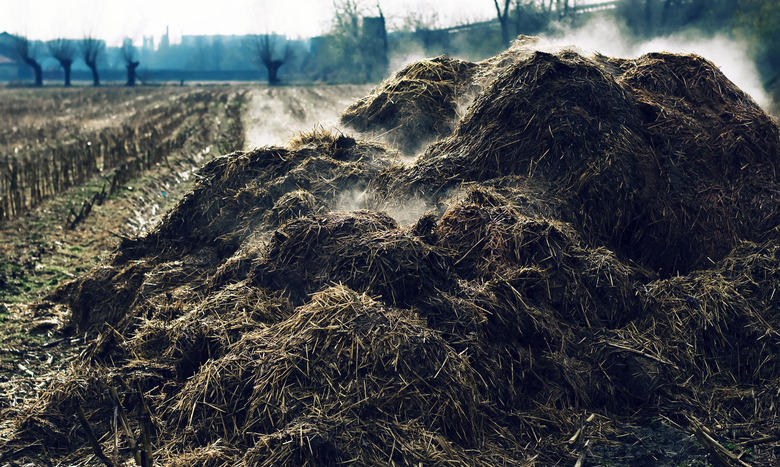The Difference Between Composted And Dehydrated Cow Manure
Homeowners are often confronted with two kinds of bagged manure — composted cow manure and dehydrated cow manure, and they have to decide which to use. Both manures provide nitrogen, phosphorous and potassium, which are the major nutrients for plant growth. Unlike many chemical fertilizers, manure also contains micronutrients, such as calcium and magnesium. Manure improves soil structure, too; it decreases soil density and increases drainage in clay soil, and it increases the moisture-holding ability of sandy soil. Although both bagged composted cow manure and dehydrated cow manure are beneficial for growing ornamental plants and vegetables, they differ due to their processing methods.
Handling Ease
Handling Ease
Dehydrated cow manure is easier than composted cow manure to handle and apply to ornamental or vegetable garden beds because it weighs less. Typically, composted cow manure is bagged in weights of 40 or more pounds while dehydrated cow manure is bagged in weights starting at 25 pounds. Composted cow manure has a much higher water content than dehydrated cow manure, which accounts for composted manure's extra weight. Usually, the source of bagged composted cow manure is dairy farms or feedlots. Quality composted manure is produced by consistent procedures that ensure appropriate turning and moisture availability during the composting process. Finished composted cow manure has a soil-like consistency. It is heated to 180 degrees Fahrenheit to produce dehydrated manure. Dehydrated cow manure is about 17 percent moisture and has been ground to a fine consistency.
Nutrient Content
Nutrient Content
Nitrogen, phosphorous and potassium are concentrated in dehydrated cow manure, and so less dehydrated than composted cow manure needs to be applied to garden beds. The amounts of total nutrients in manure are not as important as the nutrients available to plants. Phosphorous and potassium are present in manure in a user-friendly form, but nitrogen comes in two major forms: organic nitrogen and ammonia nitrogen. Organic nitrogen in manure is unavailable to plants initially but over time breaks down into available nitrogen as long as the manure is in contact with soil. Ammonia nitrogen is the major form of nitrogen that is available to plants. The high heat during the processing of dehydrated cow manure causes more of its ammonia nitrogen to dissipate into the air than composted manure loses.
Pathogen and Weed Seed Content
Pathogen and Weed Seed Content
The heat generated by microbial activity during the composting process of manure kills most pathogens and weed seeds. Turning the manure during the composting process ensures that all parts of it are exposed to optimal microbial activity. Applying heat — usually exceeding 150 degrees Fahrenheit — to produce dehydrated cow manure can reduce pathogens and weed seeds even further.
Salt Content
Salt Content
Dehydrated cow manure has a higher salt content than composted cow manure because it is a more concentrated product. Salt content is not a problem in well-draining soil and where rainfall or irrigation is sufficient. Poor soil and excessive applications of dehydrated cow manure, especially around young plants, however, can damage and cause poor growth in plants.
References
- University of Maryland Extension: Soil Amendments and Fertilizers
- University of Arkansas Cooperative Extension Service: Nutrient and Fertilizer Value of Dairy Manure
- University of Minnesota Extension: Using Manure and Compost as Nutrient Sources for Fruit and Vegetable Crops
- Ecochem: Manure Is an Excellent Fertilizer
- University of Alaska-Fairbanks Cooperative Extension Service: Animal Manure as Fertilizer
